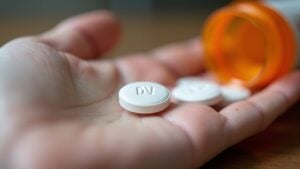Depakote, a medication often prescribed for seizures and bipolar disorder, shows promise in easing depression symptoms, especially for those with treatment-resistant or bipolar-related cases. The starting dose usually lands around 750 mg daily, split into smaller doses, though doctors adjust it based on individual needs and side effects. While it can stabilize mood swings and lift depressive episodes, potential downsides like nausea or liver risks mean careful monitoring is key. Balancing benefits and risks could make it a viable option—but only under close medical guidance.
Depakote and Its Mechanism of Action
Depakote, also known as divalproex sodium, is a medication originally designed to treat seizures and bipolar disorder, but it’s sometimes used to help with depression. Its mechanism of action involves acting as a sodium channel blocker, which helps calm overactive brain signals.
It also boosts levels of gamma-aminobutyric acid (GABA), a neurotransmitter that soothes nerve activity, while reducing glutamate, which can overstimulate the brain. These effects contribute to its mood-stabilizing and neuroprotective properties.
Though not specifically approved for depression, Depakote might help manage symptoms, especially in those with bipolar disorder. By balancing neurotransmitters, it aims to stabilize mood swings and improve emotional regulation. The exact way it works for depression isn’t fully understood, but its impact on brain chemistry suggests potential benefits.
Disclaimer: Do not take this without consulting your doctor. Always speak with your healthcare provider first.
Depakote Dosage Guidelines for Depression Treatment
How exactly should someone take Depakote whenever it’s being used to assist manage depression? While Depakote isn’t FDA-approved for depression, it can help with depressive episodes linked to bipolar disorder.
The typical starting dosage is 750 mg per day, split into 2-3 doses. Doctors might adjust this gradually, aiming for a maximum of 60 mg/kg per day, depending on how well the patient responds. Blood level checks are vital to stay within the safe range of 50-125 mcg/mL. Too little may not help, while too much increases side effect risks.
Since bipolar disorder treatment often involves balancing medication, regular monitoring ensures the dosage remains effective without harming the patient. Always follow a doctor’s guidance to tailor the treatment safely.
Efficacy of Depakote in Managing Depression Symptoms
While dosage guidelines aid in guaranteeing secure utilization, comprehending how effectively Depakote addresses depression symptoms is equally crucial. Research indicates the drug can improve depressive episodes in certain cases, particularly bipolar depression.
Studies show Depakote’s active ingredient, divalproex, could outperform a placebo and perform similarly to lithium in managing bipolar I disorder symptoms. The suggested dose—starting at 750 mg daily—focuses on balancing effects while minimizing side risks like liver concerns. However, its use for unipolar depression remains less assured.
Doctors often take lab tests to monitor safety as the drug takes weeks to show full impact. Though not a one-size-fits-all solution, it’s one option that assists some individuals whenever standard treatments fall short.
Potential Side Effects and Safety Considerations
Several key safety concerns come into play as using Depakote for depression, especially since the medication carries serious risks alongside its benefits. Common side effects include nausea, weight gain, and tremors, while serious side effects like liver damage or pancreatitis require immediate medical attention.
For people taking Depakote ER tablets to manage complex partial seizures or absence seizures in adults, doctors often start with a low total daily dose to reduce risks. Staying within the maximum recommended dosage helps prevent complications, but side effects are still likely to occur.
Older adults and pregnant women face higher risks, needing extra monitoring. Blood tests check liver function, especially in the initial six months. Severe allergic reactions, though rare, demand urgent care. Discuss safety when initiating this treatment.
Combining Depakote With Other Depression Treatments
Treating depression sometimes takes more than one approach, and Depakote could be paired with other therapies to improve results. The valproic acid in Depakote may be combined with mood stabilizers like lithium for bipolar depression, as research suggests this duo works better than either alone.
However, mixing Depakote with certain antidepressants can raise the risk of serotonin syndrome, a serious condition needing immediate care. Doctors often use therapeutic drug monitoring to avoid adverse interactions and fine-tune dosages. Close watch is especially needed when starting or adjusting treatment, since suicidal thoughts may worsen initially.
Clear communication with a healthcare provider guarantees safety while exploring combined options. It’s about balancing benefits and risks— each person’s path to stability is unique.
Conclusion
Depakote offers a steady hand in stormy seas for those battling depression, especially within bipolar disorder. While it shines in stabilizing mood, it demands careful navigation—blood tests, side effect checks, and medical teamwork—to remain safe. Like a lighthouse guiding ships, it works best with other treatments, patience, and professional support. Not a solo fix, but a powerful ally as used wisely.


